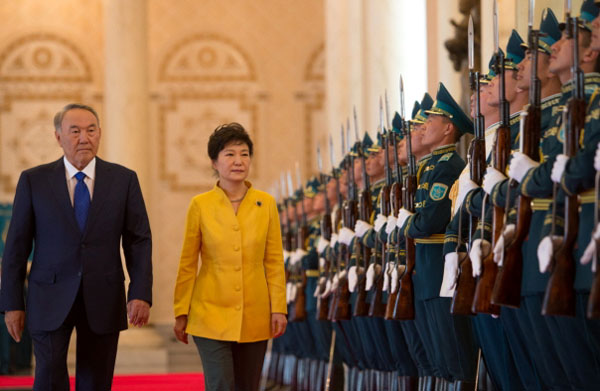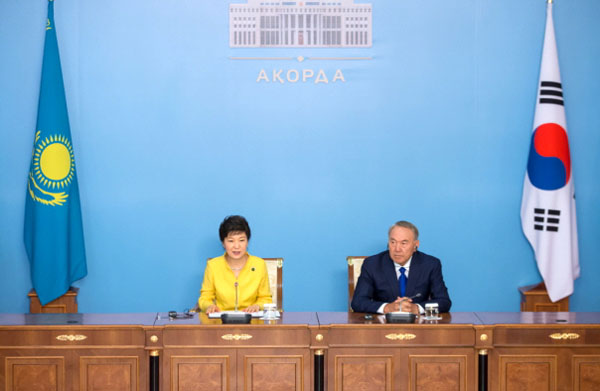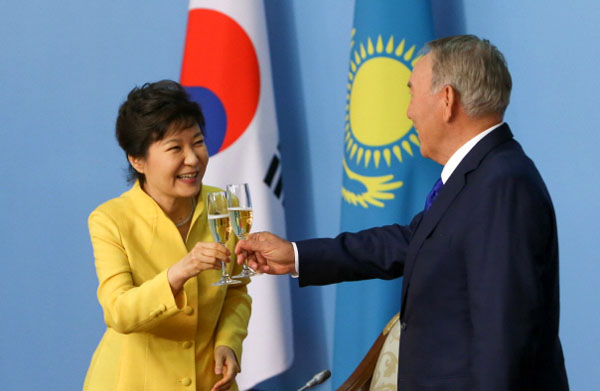-
 Korea.net's 24-hour YouTube channel
Korea.net's 24-hour YouTube channel- NEWS FOCUS
- ABOUT KOREA
- EVENTS
- RESOURCES
- GOVERNMENT
- ABOUT US
“Korea will remain the closest ally in Kazakhstan’s journey toward becoming an economic power,” affirmed President Park Geun-hye on June 19, currently on a state visit to Kazakhstan.
During a summit with her Kazakhstani counterpart, Nursultan Nazarbayev, at the presidential palace in Astana, President Park said that, “I know that there is a saying in Kazakhstan, ‘If you want a friend, set off on a journey with him.’”

“At today’s summit, we reaffirmed our commitment to remain close allies, as we need each other, and Kazakhstan’s 2050 Strategy, its national development model aimed at developing a sustainable and efficient economy, is on par with my administration‘s vision for the creative industries,” said President Park, as she predicted that the two nations would further cooperate to achieve their national goals.
She also pointed out that Kazakhstan lies at the junction of the Silk Road and that it embraces the peaceful coexistence of Islam and Christianity, which she called a “wonderful tradition.”
“I believe that it’s due to this very strong spirit and tradition that the country shut down its nuclear testing ground, the biggest one in the world, and that it abandoned its nuclear weapons voluntarily,” she stressed.

The two leaders agreed at the summit, the twelfth of its kind between the two nations, to reciprocally develop their strategic partnership. They vowed to realize three major economic cooperative projects currently underway between the two countries: a coal-fired power plant in the southern Kazakhstani city of Balkhash; a petrochemical complex in Atyrau; and, lastly, a project to drill for oil at the Zhambyl field in the Caspian Sea.
As for the USD 4.9 billion coal-fired power plant in Balkhash, a project for which a domestic Korean company won the contract to build, the two sides signed a contract under which a Kazakhstani electricity company will pay a total of USD 18.8 billion, worth around KRW 1.9 trillion, to buy all the electricity generated from the plant for the next 20 years, which amounts to about USD 920 million per year.
The two leaders also reaffirmed Kazakhstan’s commitment to supporting Korea's Eurasia Initiative, a goal set by the current administration where travelers would be able to travel by train across the Korean Peninsula and beyond, to Russia, China and Europe. They agreed to cooperate on the development of bilateral infrastructure with the signing of an MOU to cooperate on rail networks.
Meanwhile, the two heads of state agreed to expand bilateral cooperation across a range of sectors, including health care, medicine and forestry, as they vowed to further cooperate on existing projects, such as the establishment of the Korea-Kazakhstan R&D system and the Korea-Kazakhstan Technical Cooperation Center.
North Korea was also high on the summit’s agenda. The Korean president reaffirmed the Kazakhstani government’s support for her administration’s Korean Peninsula trust-building process and for her Dresden Proposals. Also, she greatly appreciated Kazakhstan’s denuclearization efforts when it abandoned its nuclear weapons voluntarily and signed the Central Asian Nuclear-Weapon-Free Zone (CANWFZ) treaty with Kyrgyzstan, Tajikistan, Turkmenistan and Uzbekistan.
Presidents Park and Nazarbayev urged North Korea to stop its nuclear program and to stop provocative actions that could pose a threat to peace and security on the Korean Peninsula and beyond.

The two leaders also agreed that North Korea must abide by the United Nations Security Council resolutions and by the 9.19 Joint Statement, struck during the fourth round of inter-Korean six-party talks in 2005.
On the sidelines of the summit, a series of agreements were signed, including a mutual agreement allowing 30 days of visa-free travel between the two countries and three MOUs to cooperate on the judiciary, forestry and on science and technology.
By Wi Tack-whan, Sohn JiAe
Korea.net Staff Writers
whan23@korea.kr
During a summit with her Kazakhstani counterpart, Nursultan Nazarbayev, at the presidential palace in Astana, President Park said that, “I know that there is a saying in Kazakhstan, ‘If you want a friend, set off on a journey with him.’”

President Park Geun-hye (right) and her Kazakhstan counterpart, Nursultan Nazarbayev (left), inspect an honor guard during a ceremonial reception at the presidential palace in Astana, Kazakhstan, on June 19. (photo: Cheong Wa Dae)
“At today’s summit, we reaffirmed our commitment to remain close allies, as we need each other, and Kazakhstan’s 2050 Strategy, its national development model aimed at developing a sustainable and efficient economy, is on par with my administration‘s vision for the creative industries,” said President Park, as she predicted that the two nations would further cooperate to achieve their national goals.
She also pointed out that Kazakhstan lies at the junction of the Silk Road and that it embraces the peaceful coexistence of Islam and Christianity, which she called a “wonderful tradition.”
“I believe that it’s due to this very strong spirit and tradition that the country shut down its nuclear testing ground, the biggest one in the world, and that it abandoned its nuclear weapons voluntarily,” she stressed.

President Park Geun-hye (left) and her Kazakhstani counterpart, Nursultan Nazarbayev, talk during a press conference at the presidential palace in Astana, Kazakhstan, on June 19. (photo: Cheong Wa Dae)
The two leaders agreed at the summit, the twelfth of its kind between the two nations, to reciprocally develop their strategic partnership. They vowed to realize three major economic cooperative projects currently underway between the two countries: a coal-fired power plant in the southern Kazakhstani city of Balkhash; a petrochemical complex in Atyrau; and, lastly, a project to drill for oil at the Zhambyl field in the Caspian Sea.
As for the USD 4.9 billion coal-fired power plant in Balkhash, a project for which a domestic Korean company won the contract to build, the two sides signed a contract under which a Kazakhstani electricity company will pay a total of USD 18.8 billion, worth around KRW 1.9 trillion, to buy all the electricity generated from the plant for the next 20 years, which amounts to about USD 920 million per year.
The two leaders also reaffirmed Kazakhstan’s commitment to supporting Korea's Eurasia Initiative, a goal set by the current administration where travelers would be able to travel by train across the Korean Peninsula and beyond, to Russia, China and Europe. They agreed to cooperate on the development of bilateral infrastructure with the signing of an MOU to cooperate on rail networks.
Meanwhile, the two heads of state agreed to expand bilateral cooperation across a range of sectors, including health care, medicine and forestry, as they vowed to further cooperate on existing projects, such as the establishment of the Korea-Kazakhstan R&D system and the Korea-Kazakhstan Technical Cooperation Center.
North Korea was also high on the summit’s agenda. The Korean president reaffirmed the Kazakhstani government’s support for her administration’s Korean Peninsula trust-building process and for her Dresden Proposals. Also, she greatly appreciated Kazakhstan’s denuclearization efforts when it abandoned its nuclear weapons voluntarily and signed the Central Asian Nuclear-Weapon-Free Zone (CANWFZ) treaty with Kyrgyzstan, Tajikistan, Turkmenistan and Uzbekistan.
Presidents Park and Nazarbayev urged North Korea to stop its nuclear program and to stop provocative actions that could pose a threat to peace and security on the Korean Peninsula and beyond.

President Park Geun-hye (left) toasts her Kazakhstani counterpart, Nursultan Nazarbayev, after sining a series of agreements at the presidential palace in Astana, Kazakhstan, on June 19. (photo: Cheong Wa Dae)
The two leaders also agreed that North Korea must abide by the United Nations Security Council resolutions and by the 9.19 Joint Statement, struck during the fourth round of inter-Korean six-party talks in 2005.
On the sidelines of the summit, a series of agreements were signed, including a mutual agreement allowing 30 days of visa-free travel between the two countries and three MOUs to cooperate on the judiciary, forestry and on science and technology.
By Wi Tack-whan, Sohn JiAe
Korea.net Staff Writers
whan23@korea.kr
Most popular
- First hearing-impaired K-pop act hopes for 'barrier-free world'
- Event 'K-Beauty Hang Out' draws hundreds in Philippines
- Ceremony in Seoul inducts 2,641 content creators of Korean culture
- 'Mad Max' director impressed by 'cinema-literate' Korean viewers
- Romanian presidential couple visits national cemetery













